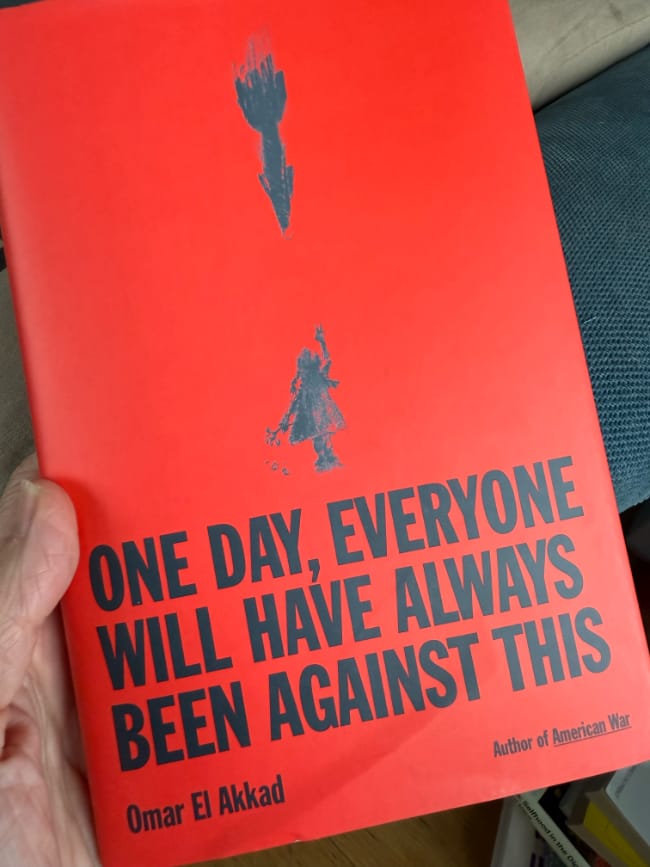- More Aud
- Posts
- Runners and Sinners and Shamers
Runners and Sinners and Shamers
The Mini 10K, "normal" and normativity, miracles and wonder, sinners and accountants
I spent far too much time last week in Zoom. And while I certainly appreciate being able to listen and talk to people all over the world via video-conferencing technology, I resent the constraints of the screens and chat boxes. I resent the surveillance. And, of course, I resent that Zoom has decided to shoehorn in AI -- that little sparkly logo that all software companies have added recently, that demonstrates they don't give a shit about the future of life and love, just of money and scale. And now the organizers of events feel duty bound to hit record, to generate transcripts, to use the AI tools to summarize things -- ripping out the nuance and context for what? For why?
I mean, the Zoom sessions I sat through were all fine: two "Fighting the Broligarchy" classes with guests Alex Hanna on Monday evening and Brian Merchant on Wednesday. I've read and enjoyed both their books, and I always love chatting with authors about how the book-sausage gets made. I also attended a We Are Open session with the group who's gathered some responses to UNESCO's call for thoughts on the future of AI and education. And I attended a Data & Society event with Alex Hanna (again!) and Emily Bender, authors of The AI Con, as well as Karen Hao, author of Empire of AI. I'm only a chapter or two into the latter, but hot damn, it's excellent -- just a scorching condemnation of OpenAI's practices and, more generally, the politics and practices of Silicon Valley.
I don't think one can say "if you use AI, you support techno-fascism," because as I noted above, every tech company has decided to push some sort of ridiculous "AI" feature into its existing products. That said, if you're advocating for AI, I do think you're complicit in furthering the techno-imperialism that Hao documents. I think many people know it too, but they've decided that that's where they feel safe and protected.

In addition to Empire of AI, I'm reading Cybernetic Revolutionaries, about Stafford Beer's work with the Chilean government of Salvador Allende; I finished Geraldine Brooks's Memorial Days about the sudden death of her husband Tony Horwitz; I read Jon Ronson's So You've Been Publicly Shamed as I was thinking about the politically regressive practice of shaming AI shamers for this morning's Second Breakfast newsletter. And this morning, I started Elaine Pagels's new book Miracles and Wonder.
I read Pagels's most famous books, Adam, Eve, and the Serpent and The Gnostic Gospels, many years ago -- as an undergraduate minoring in Women's Studies. Her work was really earth-shattering. I can't say that it destroyed my faith in god (I was raised Episcopalian but am not particularly religious or even "a believer" any more), as it did strengthen my faith in story. This new book -- and I'm only one hour into an eight-hour audiobook -- reminds me of how much I appreciate Pagels's careful literary/historical scholarship. It reminds me too of another author I recently revisited and another book from those college days -- Judith Butler's recent Who's Afraid of Gender? (and her earlier Gender Trouble, surely a foundational text in my personal canon). In their new book, Butler argues that the anti-gender fundamentalists refuse to read because they fear that to do so would expose them to doctrine to which they must bow -- that is what reading is to them: not a critical engagement with ideas, but a surrender.
"The implicit logic here seems to be that if my opponents are reading in the way I read, and reading is submission to the authority of a text, or set of texts, considered to be unified in their message and authoritative, then gender critics are like their conservative Christian critics, except that each submits to a different dogma. It follows that the gender critics imagine that their opponents read gender theory as they themselves read the Bible, or blindly accept as they do the pronouncements of their preferred authorities. In their excited imagining, gender theory relies on wrongheaded texts authored by false, often intangible authorities who wield a rival and parallel power to biblical authority and compel a similar sort of submission to its claims."
And here, of course, I can't help but make the connection to "AI" and religion -- perhaps a topic for a future Second Breakfast newsletter: that scholars of religion and proponents of "AI" are often on a spiritual quest in which they have already assumed/subsumed to the pre-ordained outcome -- life ever after, heaven in a digital brain box -- and can only find confirmation of the holy.
(I'm back to thinking that, yes, I am going to apply to a PhD program in the fall, incidentally. I say "a" PhD program, because I have narrowed it down to exactly one program here in the city where I think I might fit academically, politically.)
(I’m also still thinking that we are in the middle of another Gamergate-like resurgence of toxic tech and toxic masculinity. The shaming-shaming confirms it.)
Speaking of the holy and unholy, Kin and I finally watched Ryan Coogler's new movie Sinners. And wow. It's certainly the best movie I've seen so far this year. As Kin noted in his newsletter today, the juke joint dance scene where Sammie summoned the spirits from the otherworld -- ghosts of African music's past, present future -- was brilliant, its vitality matched by the deadliness/deathliness of the vampires, the Klan, unable to summon their own ancestors through song, only able to "turn" and colonize and destroy others.
Other viewing: Murderbot, Dept Q, and The Accountant 2. Lots to be said about the portray of disability in these -- disability as strength, except in the case of Ben Affleck's terrible acting and the story's use of autistic children enlists in corporate assassinations -- Ender's Game awfulness, for sure.
I need to do a lot more reading and thinking about all this (obviously I’m working with a long list of “need to read and think more about…”): about disability and tech and "AI," particularly the whole push to frame the latter as a "normal technology" (and what "normativity" means for neurodivergence, particularly as “AI” is bound up in eugenics, intelligence, and a certain kind of “reasoning”).
On Saturday, I was up before dawn to get to Central Park where I was one of the volunteer leaders at Mile 3, handing out water to the 10,000 runners of the 52nd annual Mini 10K, the oldest women's only road race. It was hot and humid, and as we were positioned after the strenuous climb up Cat Hill, we were absolutely overrun. It was amazing seeing all the runners, particularly the pros. (I saw Sharron Lokedi, winner of the 2024 NYC Marathon, on my run on Friday. And I briefly thought, "Oh I'll catch up with her and ask for a selfie." But ha, I can't run that fast.)

The lead pack at Mile 3. Hellen Obiri went on to win the race. Keep at eye on Weini Kelati, folks — she would’ve set the American record for the 10K if this were an eligible course.
There was some really bad behavior in and around the race: folks out for a morning jog in Central Park who refused to leave the lane where the runners were coming. The professional runners, and then the semi-pros, come like a bat out of hell, and one of the other volunteer leaders had a whistle that he was blowing, as we all were waving people off the course. But some people, wearing their headphones of course, were utterly oblivious to our signals.
More frustrating, I think, were those who refused to step off for the wheelchair and handcart athletes, each of which was accompanied by a bike escort who was also blowing a whistle and yelling at people to move. These athletes are also going incredibly fast, but because of their physical disabilities are not treated like runners and are not seen as the same kind of "danger" (I don't know if that's the right word) that the massive crowd of runners is. I was pretty disgusted by the woman who yelled back "I can do whatever I want. This is public space." I mean, yeah, that's true. Also true: you're an asshole.
Again, thinking about "AI" proponents here, so dead set on their course that they're willing to ruin shit for everyone -- particularly those who don't fit the mold of society's "reasoned" and "normal."
Imagine, looking at what’s going on with the world right now and thinking you want to call any of this “normal.”

Hard times. Hard times. — Dusty Rhodes
Stay safe out there,
~Audrey